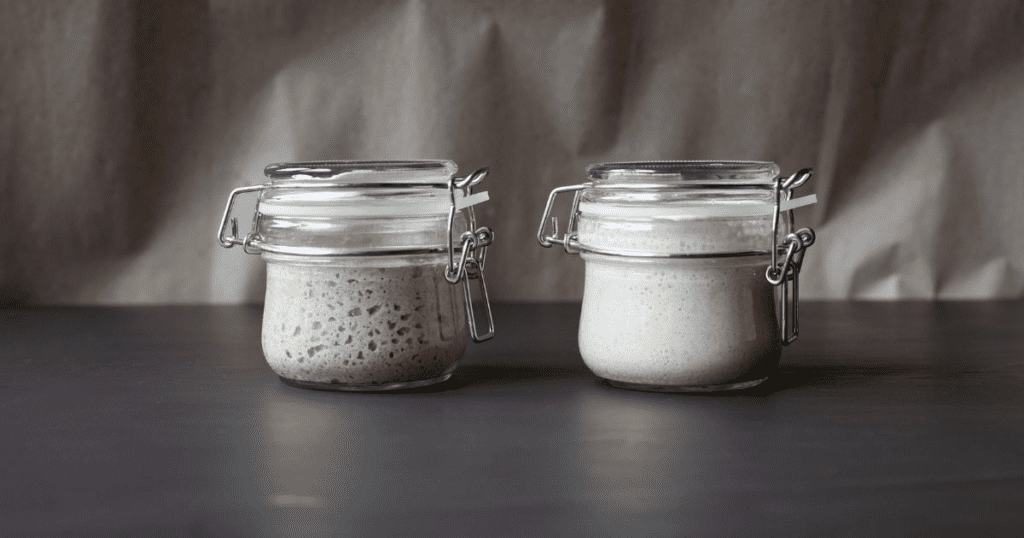
What is levain? Levain is the French word for dough. Levain, also known as sourdough or natural leaven, is a popular baking ingredient that adds flavor, structure and complexity to breads and other baked goods.
In this article, we’ll cover what levain is, types of levain and how to make your own levain at home.
What Is Levain?

Levain (lo-vane) is a fermented mixture of flour and water that is used to help breads rise and give them an unmistakable flavor.
It contains naturally occurring lactic acid bacteria (LABs), wild yeasts and lactobacillus bacteria which form an acidic culture when mixed with water.
This acid culture helps break down the starches in flour and creates sugar molecules which give bread its distinctive sweet taste.
Levains are typically made with either wheat or rye sourdough starters but can be crafted with any type of flour such as spelt, buckwheat, oat or barley flours.
Additionally, different grains will create unique tastes depending on the fermentation length of the starter and other variables like temperature or humidity levels during storage.
Typse of Levain
– White Flour Levain: White flour levains are made using white wheat flour; they ferment quickly due to their high sugar content so they don’t need much time for rising before baking. The resultant loaf or bun can have a sweet taste.
– Whole Wheat Flour Levain: Whole wheat levains are created by using whole grain wheat flour; they take longer than white flour levains because their low sugar content needs more time for fermentation before bread making starts.
The finished loaf has a nutty taste so it’s great for snacking on or making sandwiches out of it.
– Rye Flour Levain: Rye flour levains tend to produce distinctly sour loaves so they pair perfectly with other dishes that have contrasting sweeter flavors such as fruits paired with cheese boards.
Additionally, rye formulations require extra hydration so adding more liquid like warm water when creating the starter will help activate yeast cells all through the process for better results during baking.
How To Make Your Own Levain at Home
Making your own levain from scratch might seem intimidating if you haven’t done it before but trust us — it gets easier each time you do it!
Here are some tips you can use when crafting your own homemade natural starter:
1) Start small – begin by mixing together equal parts rye or whole wheat flour with warm water then let sit until it simmers into bubbly foam which indicates fermentation has started (this may take up to several days).
Scrape away any excess foam that accumulates on the top of the mixture daily and top off the mixture with more fresh liquid while stirring constantly until desired consistency is achieved (it should be thick yet still able to hold its shape).
2) Store in refrigerator – store your newly made starter in an airtight container in the fridge until ready for use as this will decrease its activity significantly without killing off any beneficial bacteria affecting texture outcome when baking later on down the line!
To bring back activity just feed regularly (every few days) by adding freshly prepared mixtures consisting of equal parts rye/whole wheat plus warm filtered water whenever desired consistency isn’t reached anymore – usually between 2 tablespoons each self feedings should suffice depending on personal preferences!
Health Benefits of Levain
Since levain contains wild yeast culture instead of commercialized active dry yeast, it offers various benefits related to nutrition because it requires less processing before making into dough than traditional bakery products made using commercial yeasts.
Due to its extended fermentation time, levain bread tends to have higher amounts microorganisms – including both beneficial probiotics as well as potentially harmful ones so consuming too much could cause discomfort from indigestion if not moderated properly .
However when consumed in moderation – i.e 2 portions per day – there’s no doubt people can benefit from dietary fibers present in levains which helps improve digestion & keeps bowel movements regular .
Furthermore , sourdough also tends to be low in gluten , therefore providing some relief against basic gluten allergies & irritations due to how gluten proteins break down.
During fermentation process thus rendering them less reactive with common problems associated with consumption of large amount of wheat based products .
In conclusion , while care should be taken when consuming large portions & more than necessary daily allowance.
Levains can be definitely regarded as good source healthy source of carbohydrates & dietary fibre due providing nutrients above mentioned health benefits .



Leave a Reply